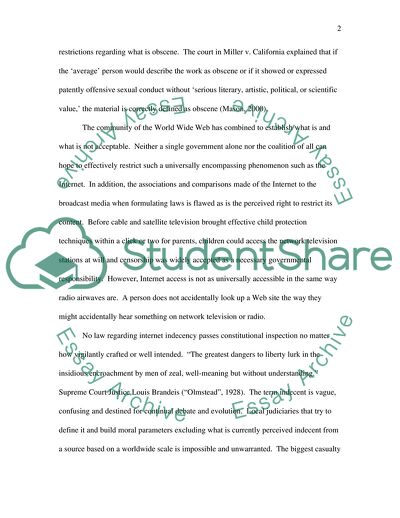
- Home
- Free Samples
- Premium Essays
- Editing Services
- Extra Tools
- Essay Writing Help
- About Us
- Studentshare
- Subjects
- Miscellaneous
- Should the Internet have to face the same indecency standards as broadcasters
Should the Internet have to face the same indecency standards as broadcasters - Essay Example

- Subject: Miscellaneous
- Type: Essay
- Level: Undergraduate
- Pages: 4 (1000 words)
- Downloads: 0
- Author: blazegreenfelde
Extract of sample "Should the Internet have to face the same indecency standards as broadcasters"
The Internet allows everyone the freedom to connect with other people and suppliers worldwide but an economical means for individuals to restrict their art or thoughts to the eyes of children is yet to be developed. Because of this lack of security technology, across the board prohibition is justified under the law, a concept that is in itself considered unlawful by a strict definition of the First Amendment of the Constitution which unambiguously guarantees the right to free speech (Pilon, 1994).
Supreme Court decisions have consistently found that the First Amendment does not apply to obscene communications and have allowed communities to establish their own restrictions regarding what is obscene. The court in Miller v. California explained that if the ‘average’ person would describe the work as obscene or if it showed or expressed patently offensive sexual conduct without ‘serious literary, artistic, political, or scientific value,’ the material is correctly defined as obscene (Mason, 2000).
The community of the World Wide Web has combined to establish what is and what is not acceptable. Neither a single government alone nor the coalition of all can hope to effectively restrict such a universally encompassing phenomenon such as the Internet. In addition, the associations and comparisons made of the Internet to the broadcast media when formulating laws is flawed as is the perceived right to restrict its content. Before cable and satellite television brought effective child protection techniques within a click or two for parents, children could access the network television stations at will and censorship was widely accepted as a necessary governmental responsibility.
However, Internet access is not as universally accessible in the same way radio airwaves are. A person does not accidentally look up a Web site the way they might accidentally hear something on network
...Download file to see next pages Read More
- TERMS & CONDITIONS
- PRIVACY POLICY
- COOKIES POLICY